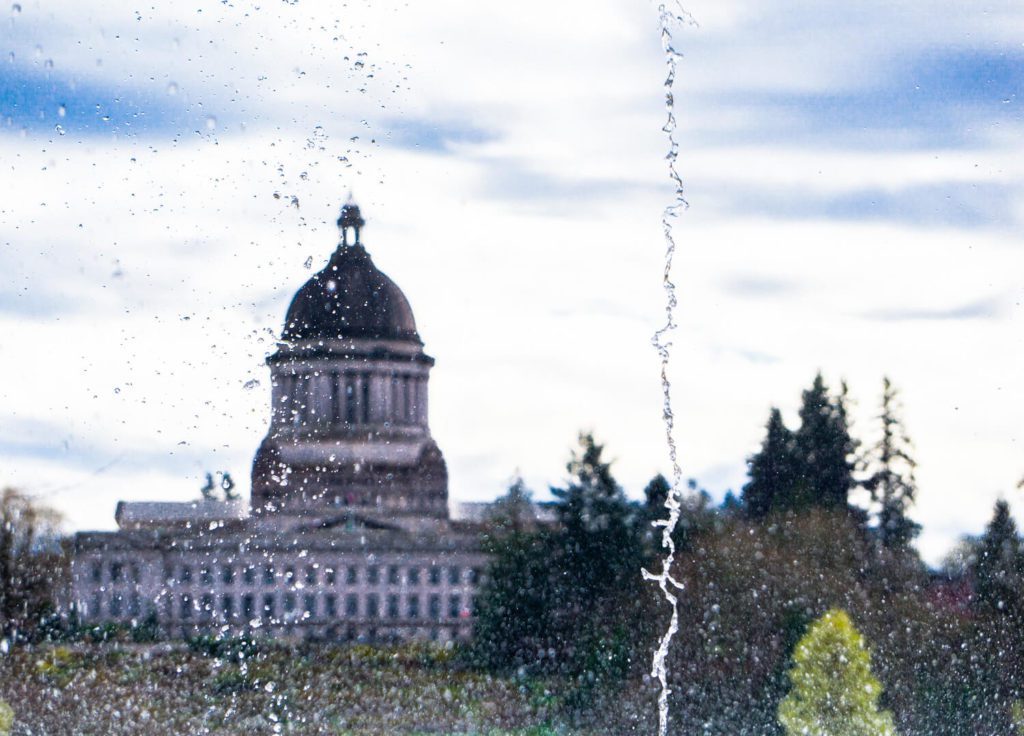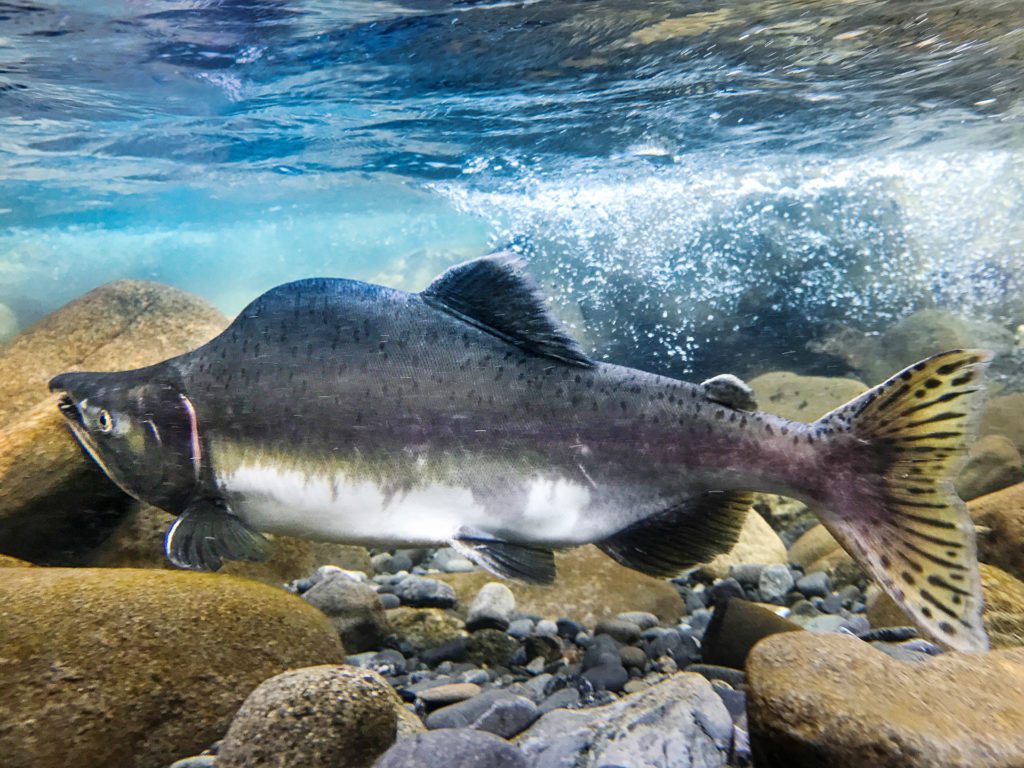If you’re reading this, chances are you want to better understand how to use your voice for strengthening environmental protections and advocating for an equitable transition to clean energy. Or perhaps you just want to advocate for an official state sport that’s not pickleball, which a 2022 law made reality. Don’t forget to sign up for our Legislative Action emails to get timely opportunities to pass important legislation!
Here’s how it works: Washington state laws are passed each year during the state’s legislative session, beginning in early January. Short sessions happen during even-numbered years and last 60 days, while long sessions happen during odd-numbered years and last for 105 days. In these whirlwind weeks, elected officials introduce bills, advance them through various House and Senate committees, hash out the differences between the two chambers’ version of a bill, and finally send them to the Governor for signing into law (or vetoing). And yes, the pickleball bill went through all these steps too. You can read a recap of what happened in 2022 here.

Additionally, during the longer sessions every two years lawmakers must pass a state budget — this is happening during the 2023 session. A lot of what RE Sources is advocating for isn’t just better laws; we will fight for important programs to get funded in the budget, such as support for low- and middle-income home weatherization and energy efficiency (a promising, effective program that’s currently only reaching 1 percent of eligible households).
As new bills are introduced that could protect (or harm) Washington’s waterways, the climate and communities, we will add legislative priorities to this list that you can join us in voicing your support (or opposition).
RE Sources 2023 legislative priorities
Washington Can’t Wait: Supporting local communities in planning for climate impacts via Growth Management Act improvements (HB 1181 / SB 5203): Supports counties in planning for climate change and creating their own climate solutions rooted in environmental justice and tailored to their own communities. If passed, this bill would help local governments advance carbon mitigation and climate resiliency measures at the local level while protecting forests and farmland from rural sprawl. This bill has gotten very close to passing in recent years; let’s make 2023 the year it finally happens. Learn more.
Washington Recycling And Packaging Act (The WRAP Act — HB 1131 / SB 5154): Over 50 percent of consumer packaging and paper in Washington goes to landfills instead of getting recycled. These bills are designed to…
- Cut down on unnecessary packaging, which often is plastic, used only once and hard to recycle
- Create a clear list of what you can and cannot commonly recycle statewide
- Create a packaging producer responsibility system, which requires companies to be responsible for packaging at the end of its life — i.e., helping fund residential recycling services for packaging and paper products across Washington. Many peoples’ curbside recycling bills have gone up 30 percent in the last 5 years, and producers should share the load. There would be a set of tiered fees on packaging manufacturers based on the recyclability and sustainability of their packaging. Similar programs have been implemented in California, Oregon, Colorado, and Maine.
- Better fund recycling systems in Washington. This funding includes improvements in infrastructure and more uniform access to recycling for residents across the state, who have limited choices when buying packaged products.
Protecting shorelines (SB 5104): This bill would direct the Department of Ecology to conduct a shoreline survey to identify abandoned, illegal, and other shoreline structures as well as updating requirements for marine structures.
Net Ecological Gain (No bill number yet): We need to actively restore many important natural systems— not just limit the damage to them. This bill would set a standard for new development to prevent further losses of salmon habitat. Currently, Washington’s land use laws require that there be “no net loss” of ecosystem integrity whenever development activities occur; however, it’s abundantly clear that development is far outpacing the restoration and protection of our watersheds and ecosystems. This bill would change the standard so that land use planners adequately protect streams, rivers, wetlands, lakes, and the lands that surround them to ensure a “net ecological gain” for salmon habitat.
Pumpout expansion to prevent wastewater pollution from boats: Remove barriers that exist for marinas to access the funding available to them through the Clean Vessel Act (CVA) Program that funds pumpouts in Washington. By removing the barrier, we hope that more marinas will apply, and we will get more pump stations throughout Puget Sound, leading to less waste dumped directly in the water.
Revitalize DNR’s Trustland Transfer Program (SB 5372): This bill would expand the ability of the Department of Natural Resources (DNR) to protect state-owned forestlands with high conservation value. Most DNR forestland is logged to generate revenue for specific beneficiaries, an archaic model developed a century ago to fund schools, libraries, and other public services. The Trustland Transfer (TLT) Program was created in the 1980s to allow DNR to decouple logging requirements from specific tracts of land, and instead protect key forests to provide ecological and public benefits—all while making the beneficiaries whole. The TLT revitalization bill would make this program more transparent, more consistent, and more effective in meeting its objectives.
Budget priorities: What should get key funding?
Protect water rights and salmon as climate change strains precious waterways (funding a water rights adjudication for the Nooksack River): The Department of Ecology is preparing to file a water rights adjudication for the Nooksack River basin and other adjoining watersheds, which will clarify who holds existing water rights, and how much water each user is due. Notably, adjudication will also quantify the treaty-protected water rights of the Nooksack Indian Tribe and Lummi Nation for the first time, which will determine how much water must remain instream to benefit salmon populations. None of this can happen unless the legislature funds Ecology’s request for $2.7 million to initiate the adjudication in 2023.
The adjudication process can also coincide with a collaborative and integrated process to address the Nooksack basin’s most pressing water challenges — they are not mutually exclusive. Learn more via Nooksack Tribe and Lummi Nation.
Salmon recovery funding: The legislature is being asked to fund a suite of salmon recovery funding programs that will make a meaningful difference for salmon recovery. These improvements will include preserving riparian vegetation, decreasing stormwater pollution, removing fish passage barriers (like culverts and dams), and more. The legislature needs to fund these requests for locally-vetted salmon recovery projects to advance. RE Sources and our partners believe that now is the time to right-size salmon investments for the future.

Allocate money from Washington’s new “cap and trade” program (Climate Commitment Act): This session, the legislature has the opportunity to invest revenue generated from the new Climate Commitment Act (CCA) into programs that actually enhance climate resilience and carbon storage capacity of our forests, wetlands and other ecosystems. One fund in particular, the “Natural Climate Solutions Account,” has the potential to expand ecosystem protections that naturally pull climate-heating carbon from the atmosphere, and increase climate resilience. The Governor’s budget earmarked $10 million from the NCS account for protecting mature legacy forests on state land. We will also track the CCA budgeting process to ensure money is allocated towards clean energy investments and climate adaptation infrastructure projects, as well as funding for a more robust air quality monitoring network that identifies which communities are most burdened with pollution.
Weatherization Plus Health Program funding: Keep existing funding as well as allocate Climate Commitment Act funds to expand the program, which is currently only used by 1-2 percent of eligible households. Weatherization Plus Health is a statewide program that effectively doubles resources to make the homes of low-income people more affordable, efficient and healthy (fixes such as preventing mold — this program goes beyond energy savings). Not only do these investments save families money on utility bills, they can also create local family-wage jobs, reduce carbon emissions, and enhance quality of life for residents.
Creation of an online portal that residents can use to find programs, rebates and other tools funded by both the state and the federal Inflation Reduction Act, that will help homeowners with the upfront cost of converting to clean electric appliances, allowing them to save on energy bills.
What bills are we opposing?
Blocking clean energy efforts in buildings (SB 5037): This bill, backed by the fracked gas industry, would prevent the State Energy Code from prohibiting “the use of natural gas for any form of heating, or for uses related to any appliance, in any building.” It would also remove achieving “the broader goal of building zero fossil-fuel greenhouse gas emission homes and buildings” from the language specifying what the State Building Code Council is to design the Code to do. This slows down vital efforts to install efficient heat pumps and other clean energy infrastructure in homes and buildings.
